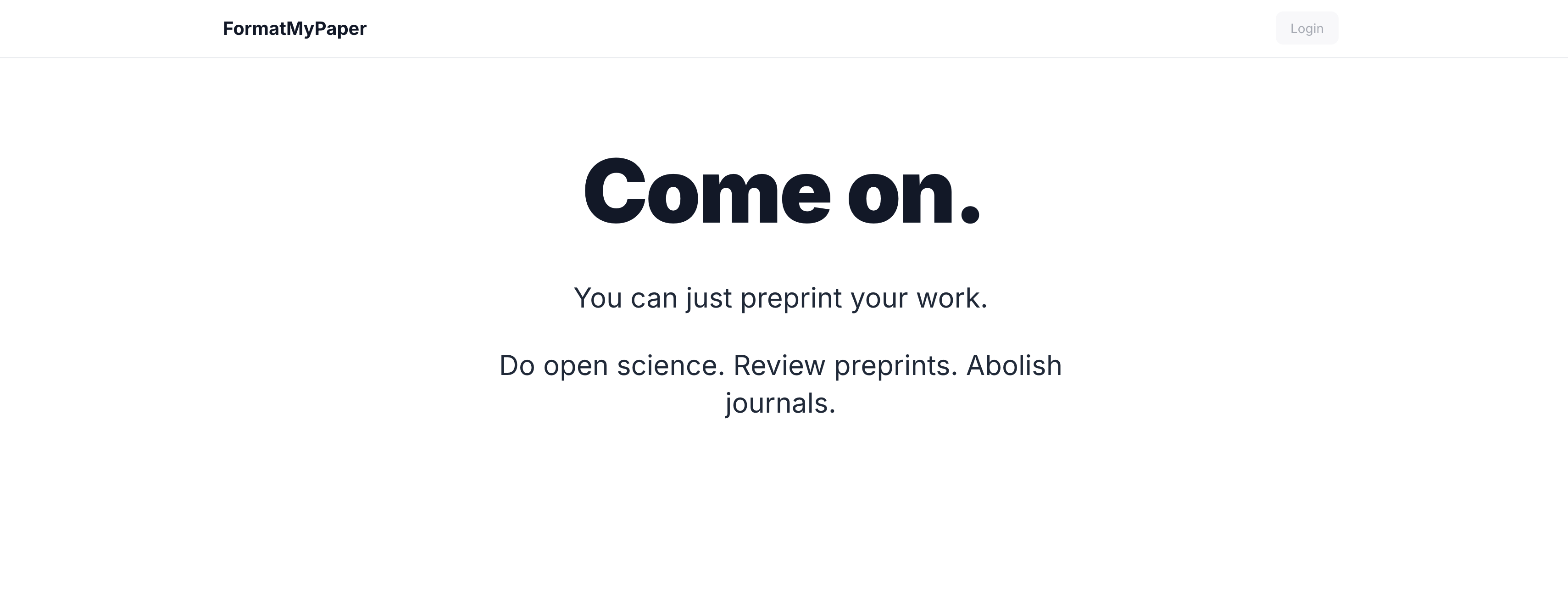Beware giving this site your unpublished data
This essay is also published on Substack, where you can comment and subscribe.
A little over a week ago, a website called formatmypaper.com took academic internet spaces by storm. It claims to use AI to take your raw, unformatted manuscript and structure it to fit the guidelines of whatever journal you intend to submit to. Academics, trained in the necessary art of skepticism, were cautioning their colleagues about the site.
“Cool idea,” one researcher wrote, “but I’d be concerned it’s stealing material/data.” Another worried, “I dont want to wake up with someone plagiarised my all unpublished work.” One user, in a remarkable display of due diligence, investigated the site’s domain registration and identified its fake testimonial 1 1 They very helpfully link the subreddit that shows that Claude seems to really like using the name Sarah Chen for anons. .
That user turned out to be right. The testimonials were fake, and I know this because I wrote them.
More accurately, I asked an AI to write them. I did that because I’m the creator of formatmypaper.com. I had a late night zoom meeting 2 2 Timezones are killer when you live on the west coast and have zooms with people in the Middle East. I needed to stay up for, and reading at that late hour would’ve put me to sleep. So, I decided to instead take in some blue light from my laptop screen and build a thing I’ve been thinking of for a while. In less than half an hour, I whipped up the code with Cursor, bought the domain for $15.50, created an SEO image, and posted about the website as if I’d just heard of it. I don’t quite know exactly when it really took off, but my guess is it’s Mike Eisen’s post.
So what is formatmypaper.com? Let’s start with what it is not. It has no database. It has no server-side logic. It is a piece of digital theater, an elaborate cardboard cutout of a tool that can neither read nor store a single word you paste into it. It’s a satire of our system. Rest assured, your data is safe. We’re a community of experts, terrified of a harmless prank site, yet seemingly unbothered by the multi-billion dollar publishing industry that actually takes our copyright, our labor, and our intellectual property every single day. We’ve been trained to fear the phantom scoop from a lone actor while ignoring the grand, institutionalized heist happening in plain sight.
When you click “Format my paper now,” the site doesn’t process anything. It simply takes you to a static page with a three-line message:
Come on. You can just preprint your work. Do open science. Review preprints. Abolish journals.

The website was meant as a joke. But the reactions turned it into an unintentional experiment. It was a mirror disguised as a tool, and when seventeen thousand researchers 3 3 17k+ sessions in less than two weeks. looked into it, the reflections were revealing. The satire was lost on most. One user on Twitter even said “maybe I’d consider going back to academia now that this is a thing”.
As absurd and upsetting as I find this, I think the earnestness confirms the premise: the collective hours we waste on the busywork of formatting constitute a real and universal pain. There were also those who saw the site and felt they immediately diagnosed the underlying disease. “Why are we formatting papers,” one asked, “when semantic markup languages have been available for decades?”
But the most telling reflection came from a third group. These were the people who understood the prank, who saw the joke for what it was, and whose immediate reaction was a sigh of disappointment. Their thought was, “Too bad. Someone should build the real thing.”
One researcher suggested integrating the tool into the preprint server bioRxiv, so a user could simply select a journal and click “format and submit.” Think about that for a moment. The proposal is to build a feature for a forward-looking open-access platform specifically to make it easier to submit work to the legacy, closed-access system we should replace.
What does a reaction like this reveal? It reveals a kind of learned helplessness. A mind so accustomed to the constraints of its environment that its first impulse is not to imagine a different world, but to seek a more efficient way of navigating its own prison.
Building the “real” version of this tool would be a profound failure. It makes an absurd system feel manageable, and in doing so, it perpetuates it. The point isn’t to build a better tool for formatting papers, it’s to create a scientific system where such a tool is laughably unnecessary.
The system is, by definition, us. We make these rules up and then choose to treat them like immutable laws of nature. They’re not. The good news is, we don’t need technology to opt out. Just opt-out of this system where journals rule how we think, how we spend our time, how we share our work with each other, how we hire, how we fire, how we fund, how we do science. We can just choose not to participate, and instead build something better. We can choose to assess the work itself rather than using journal brands as a lazy proxy for quality. We can choose to build a system where critique is a transparent, ongoing, public conversation, not the opaque judgment of three anonymous referees at one single snapshot in time. If you’re curious what it can look like, read this.
We just have to decide to do it. We have to opt out. Not just from journals, but from the entire mindset that makes them seem necessary.

